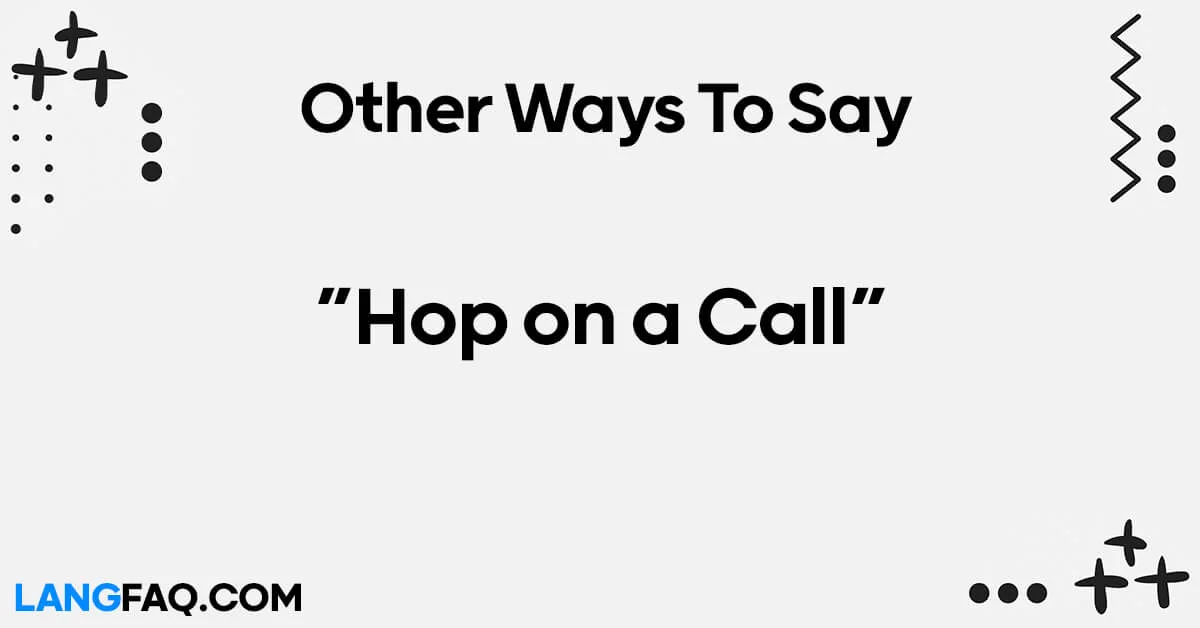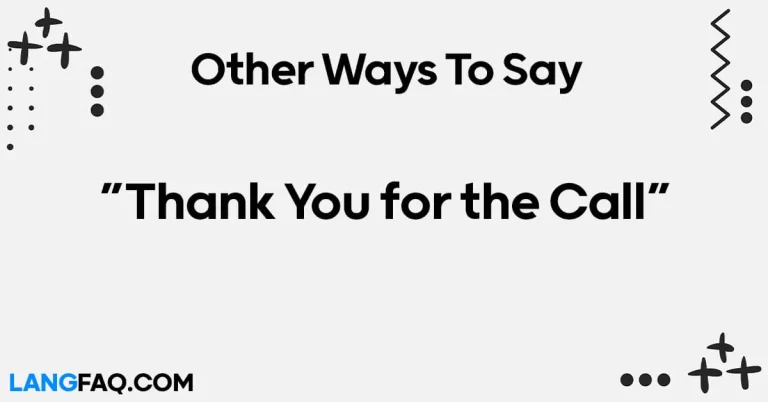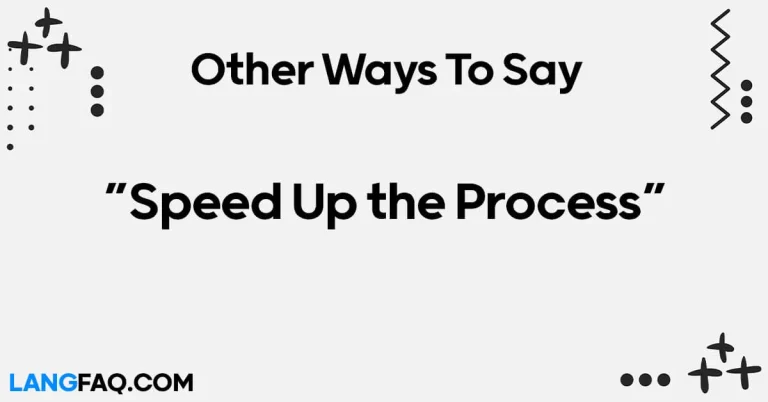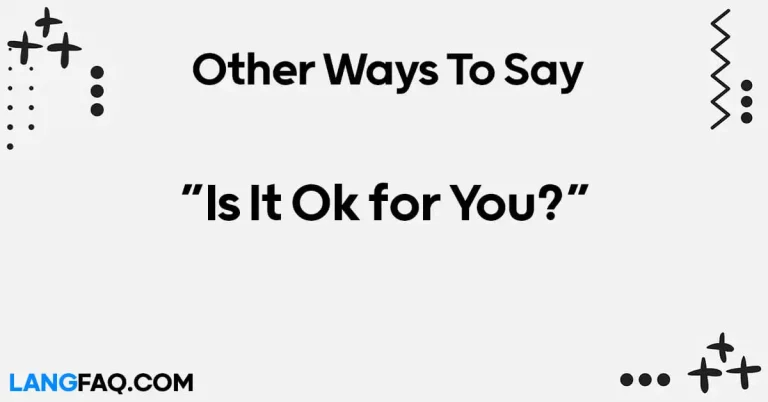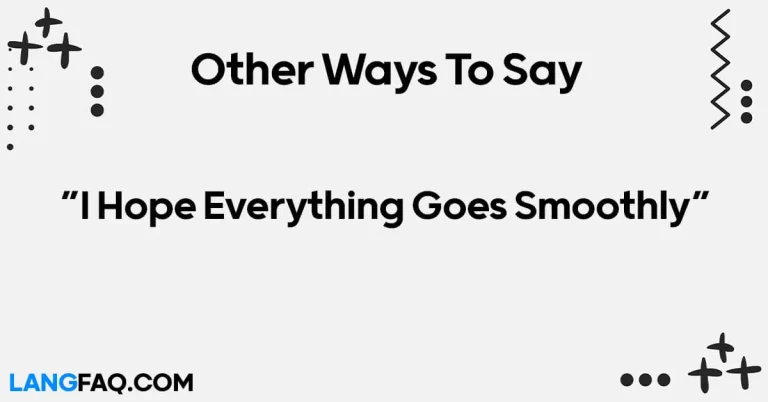In today’s fast-paced world, effective communication is key. Whether you’re scheduling a meeting with colleagues or catching up with friends, finding diverse ways to initiate a conversation can make interactions more engaging and memorable. In this article, we’ll explore twelve creative alternatives to the traditional phrase “hop on a call,” offering options suitable for various contexts and preferences.
12 Other Ways to Say “Hop on a Call”
Here are 12 alternative phrases to “Hop on a Call”:
- Let’s have a chat.
- Can we jump on a call?
- Mind if we dial in?
- Shall we connect over the phone?
- Ready for a quick conversation?
- How about a phone call?
- Let’s touch base by phone.
- Fancy a call?
- Would you be available for a chat?
- Shall we schedule a call?
- Let’s hop on a quick call.
- Can we catch up over the phone?
Here’s the table with meanings and examples for the 12 alternative phrases to “Hop on a Call”:
| Phrase | Meaning | Example |
|---|---|---|
| Let’s have a chat | Suggests a casual conversation | “Let’s have a chat about the upcoming project.” |
| Can we jump on a call? | Proposes initiating a phone conversation | “Can we jump on a call to discuss the details?” |
| Mind if we dial in? | Asks if it’s okay to join a phone call | “Mind if we dial in for a quick update?” |
| Shall we connect over the phone? | Proposes connecting via phone | “Shall we connect over the phone to discuss?” |
| Ready for a quick conversation? | Inquires about readiness for a brief talk | “Ready for a quick conversation about the agenda?” |
| How about a phone call? | Suggests having a conversation via phone | “How about a phone call to finalize the plans?” |
| Let’s touch base by phone. | Proposes a brief discussion over the phone | “Let’s touch base by phone to go over the details.” |
| Fancy a call? | Suggests having a conversation, somewhat informal | “Fancy a call to catch up on recent developments?” |
| Would you be available for a chat? | Asks if someone is free for a conversation | “Would you be available for a chat later today?” |
| Shall we schedule a call? | Proposes planning a phone conversation | “Shall we schedule a call for tomorrow morning?” |
| Let’s hop on a quick call. | Suggests joining a brief phone conversation | “Let’s hop on a quick call to discuss the updates.” |
| Can we catch up over the phone? | Proposes reconnecting via phone conversation | “Can we catch up over the phone this evening?” |
These alternative phrases offer a range of options for initiating phone conversations, catering to various levels of formality and communication preferences. Whether you’re scheduling a quick update with a colleague or reconnecting with a friend, choosing the right phrase can set the tone for a productive and engaging conversation.
Is It Correct to Say “Hop on a Call”?
Certainly!
“Hop on a call” is a colloquial expression used to suggest joining a phone conversation.
It is informal in nature but widely understood in both casual and professional settings.
The phrase implies a quick and effortless transition to the call, similar to hopping onto a mode of transportation.
While it may not be considered formal language, it is commonly used in everyday communication.
Overall, “hop on a call” is a convenient and concise way to propose initiating or joining a phone conversation.
Professional Mail Example With “Hop on a Call”
Subject: Discussion Opportunity: Let’s Hop on a Call
Dear [Recipient’s Name],
I hope this email finds you well.
I wanted to reach out to discuss [specific topic or purpose of the call]. Given the complexity and importance of the matter, I believe a phone conversation would be the most efficient way to address any questions or concerns you may have.
Would you be available to hop on a call sometime this week? I’m flexible with scheduling and can accommodate your availability.
Please let me know a convenient time for you, and I’ll make sure to arrange the call accordingly.
Looking forward to our conversation and the opportunity to discuss [topic] in more detail.
Best regards,
[Your Name]
Let’s Have a Chat
Meaning and Usage:
“Let’s have a chat” is a friendly and informal way to suggest a conversation. It can be used in both professional and personal contexts to initiate a discussion or catch up with someone.
When to Use:
This phrase is suitable for situations where you want to engage in a casual conversation, discuss ideas, or simply connect with someone on a personal level.
Example Scenario:
Professional Context: Imagine you need to discuss a project with a colleague. You could send them an email saying, “Hey [Colleague’s Name], I have a few ideas for the upcoming project. Let’s have a chat sometime this week to brainstorm.”
Personal Context: If you want to catch up with a friend, you might send them a message saying, “Hey [Friend’s Name], it’s been a while since we caught up. How about we have a chat over coffee this weekend?”
Example Sentence:
“Let’s have a chat about the new marketing strategy.”
Email Sample:
Variations:
- Let’s have a conversation.
- How about we chat?
- Can we talk for a bit?
Pros:
- Sets a friendly and relaxed tone.
- Suitable for both professional and personal conversations.
Cons:
- May be perceived as too casual in very formal settings.
Dictionary Insight:
According to Cambridge Dictionary, “have a chat” means to talk in a friendly, informal way.
Tips:
- Use this phrase to initiate conversations with colleagues, friends, or acquaintances.
- Keep the tone light and positive to maintain a friendly atmosphere.
Can We Jump on a Call?
Meaning and Usage:
“Can we jump on a call?” is a direct and informal way to suggest a phone conversation. It is commonly used in professional settings to schedule meetings or discuss important matters.
When to Use:
This phrase is appropriate when you need to have a quick or urgent conversation with someone, especially if you prefer verbal communication over written correspondence.
Example Scenario:
Professional Context: Suppose you need to discuss a project update with your team lead. You could send them a message saying, “Hey [Team Lead’s Name], can we jump on a call later today to go over the latest developments?”
Personal Context: If you need to make a quick decision with a friend, you might text them, “Hey [Friend’s Name], can we jump on a call real quick to discuss our weekend plans?”
Example Sentence:
“Can we jump on a call to finalize the agenda?”
Email Sample:
Subject: Quick Call Needed
Hi [Recipient’s Name],
I hope this finds you well! Can we jump on a call later today to discuss the project updates? I have a few ideas I’d like to run by you.
Let me know if that works for you.
Best regards, [Your Name]
Variations:
- Shall we have a call?
- Do you have time for a call?
- Can we talk on the phone?
Pros:
- Conveys a sense of urgency and directness.
- Allows for immediate discussion and decision-making.
Cons:
- May not be suitable for very formal or lengthy discussions.
Dictionary Insight:
According to Merriam-Webster, “jump on a call” means to start a phone conversation.
Tips:
- Use this phrase when you need quick responses or decisions.
- Keep the call focused to respect the other person’s time.
Mind If We Dial In?
Meaning and Usage:
“Mind if we dial in?” is a polite way to ask if it’s okay to join a phone call. It shows consideration for the other person’s schedule and availability.
When to Use:
This phrase is suitable for both professional and personal contexts when you need to join a conference call or virtual meeting.
Example Scenario:
Professional Context: If you’re organizing a conference call with clients, you might send them an email saying, “Hi [Client’s Name], we have a team meeting scheduled for tomorrow. Mind if we dial you in?”
Personal Context: Suppose you’re planning a virtual gathering with friends. You could message them, “Hey everyone, we’re having a Zoom hangout this Friday. Mind if we dial you in?”
Example Sentence:
“Mind if we dial in for a quick update?”
Email Sample:
Subject: Conference Call Tomorrow
Hi [Team],
We have our weekly team meeting scheduled for tomorrow at 10:00 AM. Mind if we dial in to discuss the latest project updates?
Looking forward to connecting with everyone.
Best, [Your Name]
Variations:
- Would you mind joining the call?
- Is it okay if we include you in the call?
- Do you have time to dial in?
Pros:
- Demonstrates respect for the other person’s time.
- Allows for confirmation before including someone in a call.
Cons:
- May add an extra step to the communication process.
Dictionary Insight:
According to Oxford Languages, “dial in” means to connect to a computer system or network by telephone.
Tips:
- Use this phrase to politely invite someone to join a call.
- Wait for confirmation before including someone in the call to avoid any inconvenience.
Shall We Connect Over the Phone?
Meaning and Usage:
“Shall we connect over the phone?” is a formal and polite way to suggest a phone conversation. It’s suitable for professional contexts where courtesy and professionalism are valued.
When to Use:
This phrase is appropriate when you need to discuss important matters or have a formal conversation with someone, such as a client or business associate.
Example Scenario:
Professional Context: Suppose you need to schedule a consultation with a potential client. You might send them an email saying, “Dear [Client’s Name], shall we connect over the phone to discuss your requirements in detail?”
Personal Context: If you’re planning to catch up with a distant relative, you could call them and say, “Hi [Relative’s Name], I thought we could connect over the phone this weekend and chat for a while.”
Example Sentence:
“Shall we connect over the phone to finalize the details?”
Email Sample:
Subject: Phone Discussion Request
Dear [Recipient’s Name],
I hope this email finds you well. I’d like to discuss the upcoming project in more detail. Shall we connect over the phone sometime this week to go over the specifics?
Looking forward to our conversation.
Best regards, [Your Name]
Variations:
- Would you like to have a phone call?
- Could we schedule a phone conversation?
- Are you available for a phone discussion?
Pros:
- Conveys professionalism and courtesy.
- Sets a formal tone for the conversation.
Cons:
- May be perceived as too formal in casual settings.
Dictionary Insight:
According to Collins Dictionary, “connect over the phone” means to communicate with someone using a telephone.
Tips:
- Use this phrase in professional settings to maintain a formal tone.
- Be prepared with an agenda or talking points to make the conversation productive.
Ready for a Quick Conversation?
Meaning and Usage:
“Ready for a quick conversation?” is a straightforward and informal way to propose a discussion over the phone. It suggests a brief and focused exchange of ideas or information.
When to Use:
This phrase is suitable for situations where you need to have a short and efficient conversation, such as providing updates or asking quick questions.
Example Scenario:
Professional Context: Suppose you need clarification on a project task from a colleague. You might message them, “Hi [Colleague’s Name], are you ready for a quick conversation to discuss the client’s feedback?”
Personal Context: If you want to check in with a friend about weekend plans, you could call them and say, “Hey [Friend’s Name], ready for a quick conversation to finalize our Saturday outing?”
Example Sentence:
“Ready for a quick conversation to iron out the details?”
Email Sample:
Subject: Quick Chat Needed
Hi [Recipient’s Name],
I hope you’re doing well! Are you available for a quick conversation later today? I have a few updates to share regarding the project.
Looking forward to catching up.
Best regards, [Your Name]
Variations:
- Are you up for a quick call?
- Can we have a brief discussion?
- Would you like to chat briefly?
Pros:
- Indicates a desire for efficiency and promptness.
- Allows for focused communication without taking up too much time.
Cons:
- May not be suitable for in-depth discussions or sensitive topics.
Dictionary Insight:
According to Macmillan Dictionary, “quick conversation” refers to a brief exchange of words or information.
Tips:
- Use this phrase when you need to address a specific topic or issue promptly.
- Keep the conversation concise and to the point to respect the other person’s time.
How About a Phone Call?
Meaning and Usage:
“How about a phone call?” is a casual and friendly way to suggest switching from written communication to a verbal conversation. It invites a more immediate and personal form of interaction.
When to Use:
This phrase is appropriate when you want to engage in a spontaneous or informal conversation, whether it’s with a colleague, friend, or family member.
Example Scenario:
Professional Context: If you’ve been exchanging emails with a client and need to discuss details further, you might write, “Hi [Client’s Name], how about a phone call to clarify any remaining questions?”
Personal Context: Suppose you’ve been messaging a friend about weekend plans. You could say, “Hey [Friend’s Name], how about a phone call to finalize our movie night arrangements?”
Example Sentence:
“How about a phone call to discuss this in more detail?”
Email Sample:
Subject: Let’s Chat!
Hi [Recipient’s Name],
I hope you’re having a great day! I was thinking, how about a phone call to go over the project timeline? I believe it would be more efficient than exchanging emails back and forth.
Let me know if that works for you.
Best, [Your Name]
Variations:
- Want to chat on the phone?
- How about we talk over the phone?
- Can we switch to a phone call?
Pros:
- Offers a more personal and immediate form of communication.
- Allows for clearer and more nuanced discussions compared to written messages.
Cons:
- May not be suitable if the other person prefers written communication.
Dictionary Insight:
According to Oxford Languages, “how about” is used to make a suggestion or offer.
Tips:
- Use this phrase to transition from written communication to a phone call.
- Respect the other person’s preference for communication and be flexible in your approach.
Let’s Touch Base by Phone
Meaning and Usage:
“Let’s touch base by phone” is a professional and collaborative way to suggest a phone conversation to discuss updates, progress, or next steps. It emphasizes the importance of staying connected and informed.
When to Use:
This phrase is suitable for work-related discussions, such as project updates, team meetings, or check-ins with clients or stakeholders.
Example Scenario:
Professional Context: Suppose you’re working on a project with a remote team. You might send them a message saying, “Hi team, let’s touch base by phone tomorrow morning to review our progress and address any challenges.”
Personal Context: If you’re coordinating plans with a group of friends, you could suggest a phone call by saying, “Hey everyone, let’s touch base by phone this evening to finalize our weekend getaway details.”
Example Sentence:
“Let’s touch base by phone to ensure we’re all on the same page.”
Email Sample:
Subject: Team Meeting Tomorrow
Hi Team,
I hope you’re doing well! Let’s touch base by phone tomorrow morning at 10:00 AM to discuss the latest project updates and address any issues or concerns.
Looking forward to our conversation.
Best regards, [Your Name]
Variations:
- Shall we have a phone check-in?
- Can we touch base over the phone?
- Let’s connect for a quick update call.
Pros:
- Encourages collaboration and alignment within teams or groups.
- Provides an opportunity to discuss progress and address any challenges in real-time.
Cons:
- May require scheduling coordination among multiple parties.
Dictionary Insight:
According to Merriam-Webster, “touch base” means to talk to someone in order to find out how they are or what they think about something.
Tips:
- Use this phrase to foster communication and collaboration within your team or group.
- Prepare an agenda or talking points to ensure a productive discussion during the phone call.
Fancy a Call?
Meaning and Usage:
“Fancy a call?” is a casual and friendly way to suggest a phone conversation. It invites the other person to engage in a spontaneous or relaxed chat.
When to Use:
This phrase is appropriate for informal conversations with friends, family members, or colleagues when you want to catch up, share news, or simply chat.
Example Scenario:
Professional Context: Suppose you’ve been collaborating with a colleague on a project. You might send them a message saying, “Hey [Colleague’s Name], fancy a call to discuss the next steps for the project?”
Personal Context: If you want to catch up with a friend you haven’t spoken to in a while, you could call them and say, “Hey [Friend’s Name], fancy a call to catch up on life?”
Example Sentence:
“Fancy a call to brainstorm ideas for the presentation?”
Email Sample:
Subject: Let’s Catch Up!
Hi [Friend’s Name],
It’s been too long since we last caught up! Fancy a call this weekend to chat about everything that’s been going on?
Looking forward to reconnecting.
Best, [Your Name]
Variations:
- Up for a chat?
- Want to have a quick call?
- How about a spontaneous phone conversation?
Pros:
- Creates a relaxed and informal atmosphere for conversation.
- Allows for spontaneous and enjoyable interactions.
Cons:
- May not be suitable for very formal or professional discussions.
Dictionary Insight:
According to Cambridge Dictionary, “fancy” means to want to have or do something.
Tips:
- Use this phrase to initiate casual conversations and maintain social connections.
- Keep the tone light and friendly to encourage engagement and participation.
Would You Be Available for a Chat?
Meaning and Usage:
“Would you be available for a chat?” is a polite and respectful way to ask someone if they have time for a conversation. It shows consideration for their schedule and availability.
When to Use:
This phrase is appropriate when you want to engage in a one-on-one conversation with someone, whether it’s for professional purposes or to catch up on personal matters.
Example Scenario:
Professional Context: Suppose you need to discuss a project with a colleague. You might send them an email saying, “Hi [Colleague’s Name], would you be available for a chat later today to go over the project details?”
Personal Context: If you want to check in with a friend about their recent vacation, you could message them, “Hey [Friend’s Name], would you be available for a chat this evening? I’d love to hear about your trip.”
Example Sentence:
“Would you be available for a chat to discuss the agenda?”
Email Sample:
Subject: Quick Discussion Needed
Hi [Recipient’s Name],
I hope you’re doing well! I have a few updates to share with you regarding the upcoming event. Would you be available for a chat later today to go over the details?
Looking forward to our conversation.
Best regards, [Your Name]
Variations:
- Are you free for a chat?
- Can we have a quick discussion?
- Would you mind chatting for a bit?
Pros:
- Shows respect for the other person’s time and availability.
- Allows for scheduling flexibility based on their response.
Cons:
- May not be suitable if the other person is busy or unavailable.
Dictionary Insight:
According to Oxford Languages, “available” means able to be used or obtained; at someone’s disposal.
Tips:
- Use this phrase to request a conversation in a polite and considerate manner.
- Offer alternative time options if the person is unavailable initially to accommodate their schedule.
Shall We Schedule a Call?
Meaning and Usage:
“Shall we schedule a call?” is a formal and proactive way to propose setting up a phone conversation. It implies planning and organization to ensure a productive discussion.
When to Use:
This phrase is appropriate for professional contexts when you need to have a focused and structured conversation, such as discussing project timelines or addressing specific issues.
Example Scenario:
Professional Context: Suppose you need to coordinate a meeting with a client. You might send them an email saying, “Dear [Client’s Name], shall we schedule a call next week to discuss the project milestones?”
Personal Context: If you want to catch up with a friend who lives in a different time zone, you could message them, “Hey [Friend’s Name], shall we schedule a call for this weekend to catch up?”
Example Sentence:
“Shall we schedule a call to finalize the details?”
Email Sample:
Subject: Phone Meeting Request
Dear [Recipient’s Name],
I hope this email finds you well. I believe it would be beneficial for us to schedule a call to discuss the project progress and address any challenges. Are you available to schedule a call sometime this week?
Looking forward to your response.
Best regards, [Your Name]
Variations:
- Can we set up a call?
- Would you like to arrange a phone meeting?
- Is it possible to schedule a call?
Pros:
- Demonstrates professionalism and proactive communication.
- Allows for efficient planning and coordination of discussions.
Cons:
- May require coordinating schedules and availability.
Dictionary Insight:
According to Merriam-Webster, “schedule” means to plan or arrange for a specific time or date.
Tips:
- Use this phrase to initiate formal discussions and ensure that both parties are prepared and available.
- Provide options for meeting times to accommodate different schedules.
Let’s Hop on a Quick Call
Meaning and Usage:
“Let’s hop on a quick call” is a casual and proactive way to suggest a brief phone conversation. It implies urgency and efficiency, emphasizing the need for a timely discussion.
When to Use:
This phrase is suitable for situations where you need to address an immediate issue, provide quick updates, or make rapid decisions.
Example Scenario:
Professional Context: Suppose you need to resolve an urgent issue with a project team. You might send them a message saying, “Hey team, let’s hop on a quick call to address the client’s feedback.”
Personal Context: If you want to discuss weekend plans with a friend, you could call them and say, “Hey [Friend’s Name], let’s hop on a quick call to finalize our Saturday outing.”
Example Sentence:
“Let’s hop on a quick call to discuss the next steps.”
Email Sample:
Subject: Urgent Call Needed
Hi [Recipient’s Name],
I hope you’re doing well! I believe it’s important for us to address the recent developments as soon as possible. Let’s hop on a quick call to discuss the situation and determine our course of action.
Looking forward to connecting with you.
Best regards, [Your Name]
Variations:
- Want to jump on a call?
- Can we have a fast call?
- Let’s connect briefly over the phone.
Pros:
- Conveys a sense of urgency and prompt action.
- Allows for immediate discussion and decision-making.
Cons:
- May not be suitable for lengthy or detailed conversations.
Dictionary Insight:
According to Cambridge Dictionary, “hop on” means to quickly join or start using something.
Tips:
- Use this phrase when you need immediate responses or decisions.
- Keep the call focused and to the point to respect everyone’s time.
Can We Catch Up Over the Phone?
Meaning and Usage:
“Can we catch up over the phone?” is a friendly and informal way to suggest reconnecting with someone via a phone conversation. It’s ideal for maintaining relationships and staying in touch.
When to Use:
This phrase is appropriate when you want to catch up with friends, family members, or acquaintances to share news, stories, or updates.
Example Scenario:
Personal Context: Suppose you want to check in with a friend you haven’t spoken to in a while. You might send them a message saying, “Hey [Friend’s Name], can we catch up over the phone sometime this week? I’d love to hear what you’ve been up to.”
Professional Context: If you want to reconnect with a former colleague, you could email them and say, “Hi [Colleague’s Name], it’s been a while since we last spoke. Can we catch up over the phone to discuss potential collaboration opportunities?”
Example Sentence:
“Can we catch up over the phone this weekend?”
Email Sample:
Subject: Let’s Reconnect!
Hi [Recipient’s Name],
I hope you’re doing well! It’s been too long since we last caught up. Can we catch up over the phone sometime this week? I’d love to hear about what’s been going on in your life.
Looking forward to reconnecting.
Best regards, [Your Name]
Variations:
- Want to have a phone chat?
- Can we reconnect over the phone?
- Shall we catch up via a phone call?
Pros:
- Facilitates reconnection and relationship-building.
- Allows for meaningful conversations and sharing of experiences.
Cons:
- May require finding a mutually convenient time for the call.
Dictionary Insight:
According to Merriam-Webster, “catch up” means to talk with someone you have not seen for some time in order to find out what has been happening.
Tips:
- Use this phrase to maintain relationships and stay connected with friends, family, or colleagues.
- Be prepared to actively listen and share your own updates during the conversation.
FAQs:
How do I politely suggest a call without using the phrase “hop on a call”?
To suggest a call politely, you can use phrases like “Would you be available for a quick chat?” or “Could we schedule a call to discuss this further?”
What are some alternative phrases for initiating a video call?
Instead of saying “hop on a call,” you can say “Let’s connect via video,” “Shall we jump on a video call?” or “Time to dial into the video conference.”
Can I use informal language when suggesting a call to a colleague?
Yes, using informal language like “Mind if we catch up?” or “Ready to conference in?” can create a friendly atmosphere for communication with colleagues.
Are there any professional alternatives to the phrase “hop on a call”?
Yes, phrases like “Let’s touch base,” “Time to dial in,” or “Shall we schedule a conference call?” are suitable for professional communication.
How can I make virtual meetings more engaging?
To make virtual meetings more engaging, you can incorporate interactive elements like polls or breakout sessions, encourage active participation from all attendees, and use visual aids to enhance presentations.
Is it necessary to specify the communication platform when suggesting a call?
Specifying the communication platform, such as Zoom or Teams, can help streamline the meeting logistics and ensure that all participants are prepared for the call.
Conclusion:
In conclusion, diversifying your communication repertoire with alternative phrases to “hop on a call” can enhance engagement, clarity, and professionalism in your interactions. Whether you’re scheduling a formal meeting or catching up with friends, choosing the right phrase can set the tone for a productive and meaningful conversation. By incorporating these twelve alternatives into your communication toolkit, you can navigate various contexts with confidence and finesse, fostering stronger connections and more effective collaboration.

